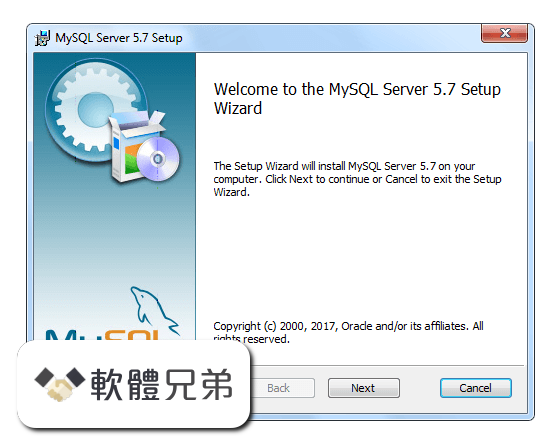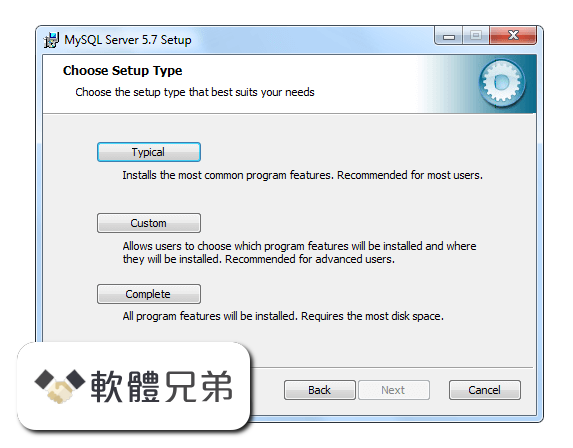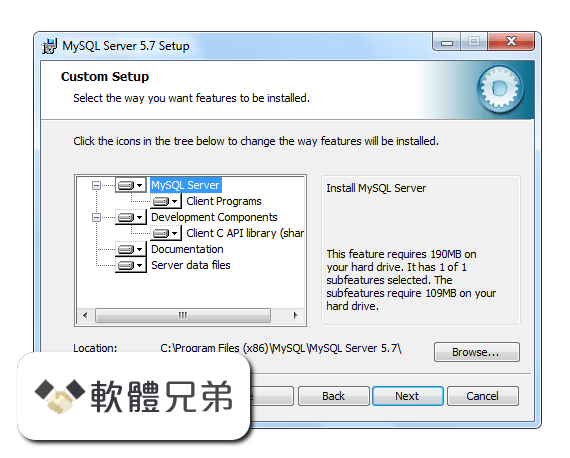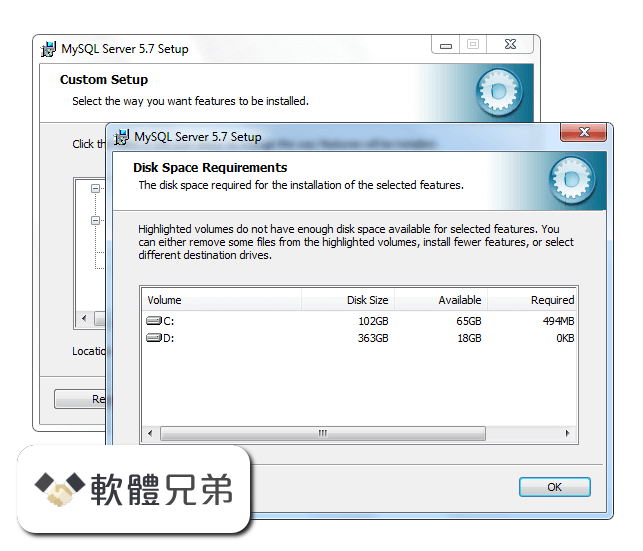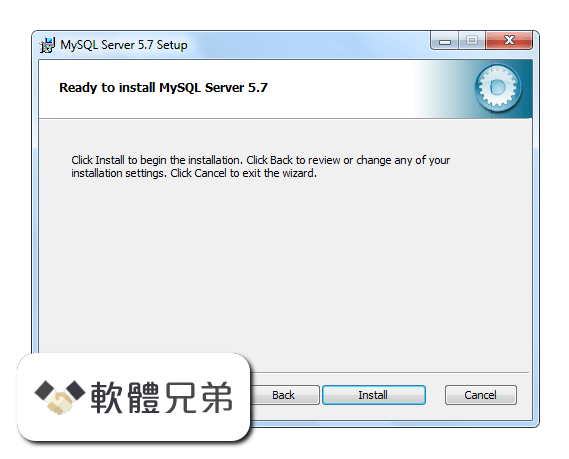|
What's new in this version: Functionality Added or Changed:
- Important Change; Replication: By default, when promoting integers from a smaller type on the master to a larger type on the slave (for example, from a SMALLINT column on the master to a BIGINT column on the slave), the promoted values are treated as though they are signed. Now in such cases it is possible to modify or override this behavior using one or both of ALL_SIGNED, ALL_UNSIGNED in the set of values specified for the slave_type_conversions server system variable. For more information, see Row-based replication: attribute promotion and demotion, as well as the description of the variable. (Bug #15831300)
- Previously, program options could be specified in full or as any unambiguous prefix. For example, the --compress option could be given to mysqldump as --compr, but not as --comp because the latter is ambiguous. Option prefixes now are deprecated. They can cause problems when new options are implemented for programs. A prefix that is currently unambiguous might become ambiguous in the future. If an unambiguous prefix is given, a warning now occurs to provide feedback. Warning: Using unique option prefix compr instead of compress is deprecated and will be removed in a future release. Please use the full name instead.
- Option prefixes are no longer supported in MySQL 5.7; only full options are accepted. (Bug #16996656)
- The C API libmysqlclient shared-library .so files now have version 18.1.0 (up from version 18.0.0 used in MySQL 5.5). (Bug #16809055)
- In batch mode, mysql formatted result status messages such as “"Query OK, 1 row affected"” but did not print them. Now these messages are not formatted. (Bug #69486, Bug #16971432)
Bugs Fixed:
- Performance; Important Change; InnoDB: InnoDB would fail to open a tablespace that has multiple data files. This removes the known limitation that was in MySQL Server 5.6.12. (Bug #17033706, Bug #69623)
- Performance; InnoDB: A code regression introduced in MySQL 5.6 negatively impacted DROP TABLE and ALTER TABLE performance. This could cause a performance drop between MySQL Server 5.5.x and 5.6.x. (Bug #16864741, Bug #69316)
- Performance; InnoDB: When innodb_thread_concurrency is set to a non-zero value, there was a possibility that all innodb_concurrency_tickets would be released after each row was read, resulting in a concurrency check after each read. This could impact performance of all queries. One symptom could be higher system CPU usage. We strongly recommend that you upgrade to MySQL Server 5.6.13 if you use this setting. This could cause a performance drop between MySQL Server 5.5.x and 5.6.x. (Bug #68869, Bug #16622478)
- Incompatible Change: It is possible for a column DEFAULT value to be valid for the sql_mode value at table-creation time but invalid for the sql_mode value when rows are inserted or updated. In this case, 0 should be accepted for the CREATE TABLE but rejected for the INSERT. However, the server did not evaluate DEFAULT values used for inserts or updates against the current sql_mode. In the example, the INSERT succeeds and inserts '0000-00-00' into the DATE column.
- The server now applies the proper sql_mode checks to generate a warning or error at insert or update time.
- A resulting incompatibility for replication if you use statement-based logging (binlog_format=STATEMENT) is that if a slave is upgraded, a nonupgraded master will execute the preceding example without error, whereas the INSERT will fail on the slave and replication will stop.
- To deal with this, stop all new statements on the master and wait until the slaves catch up. Then upgrade the slaves followed by the master. Alternatively, if you cannot stop new statements, temporarily change to row-based logging on the master (binlog_format=ROW) and wait until all slaves have processed all binary logs produced up to the point of this change. Then upgrade the slaves followed by the master and change the master back to statement-based logging. (Bug #68041, Bug #16078943)
- MySQL Cluster: CREATE LOGFILE GROUP failed with a syntax error when INITIAL_SIZE, UNDO_BUFFER_SIZE, or both options were specified. (Bug #13116514)
- InnoDB: The server would crash during a memcached set operation. The failure was due to a padded length value for a utf8 char column. During a memcached update operation, a field from an old tuple would be copied with a data length that was less than the padded utf8 char column value. This fix ensures that old tuples are not copied. Instead, a new tuple is created each time. (Bug #16875543)
- InnoDB: When CHECK TABLE found a secondary index that contained the wrong number of entries, it would report an error but not mark the index as corrupt. CHECK TABLE now marks the index as corrupt when this error is encountered, but only the index is marked as corrupt, not the table. As a result, only the index becomes unusable until it is dropped and rebuilt. The table is unaffected. (Bug #16914007)
- InnoDB: InnoDB would attempt to gather statistics on partially created indexes. (Bug #16907783)
- InnoDB: A full-text search using the IN BOOLEAN MODE modifier would result in an assertion failure. (Bug #16927092)
- References: This bug is a regression of Bug #16516193.
- InnoDB: The two INFORMATION_SCHEMA tables for the InnoDB buffer pool could show an invalid page type for read-fixed blocks. This fix will show the unknown page type for blocks that are I/O-fixed for reading. (Bug #16859867)
- InnoDB: During an insert buffer merge, InnoDB would invoke lock_rec_restore_from_page_infimum() on a potentially invalid record pointer. (Bug #16806366)
- InnoDB: The innodb_rwlock_x_spin_waits item in the INFORMATION_SCHEMA.INNODB_METRICS table would show the same value as the innodb_rwlock_x_os_waits item. (Bug #16798175)
- InnoDB: A memory leak would occur when inserting or replacing a row in a full-text search index on a table with more than 96 columns. (Bug #16809167)
- InnoDB: In debug builds, an assertion could occur in OPT_CHECK_ORDER_BY when using binary directly in a search string, as binary may include NULL bytes and other non-meaningful characters. This fix will remove non-meaningful characters before the search is run. (Bug #16766016)
- InnoDB: The page_zip_validate() consistency check would fail after compressing a page, in page_zip_compress(). This problem was caused by page_zip_decompress(), which would fail to set heap_no correctly when a record contained no user data bytes. A record with no user data bytes occurs when, for example, a primary key is an empty string and all secondary index fields are NULL or an empty string. (Bug #16736929)
- InnoDB: A race condition would occur between ALTER TABLE ... ADD KEY and INSERT statements, resulting in an “Unable to Purge a Record” error. (Bug #16628233)
- InnoDB: A full-text search that returns large result sets would consume an excessive amount of memory due to use of a red-black tree for holding full-text search results. This fix reduces and imposes a limit on memory consumption. If the limit is exceeded, a message is returned indicating that the full-text search query exceeds the maximum allowed memory. (Bug #16625973)
- InnoDB: Restarting InnoDB in read-only mode and running a workload would occasionally return a global_segment < os_aio_n_segments assertion. (Bug #16362046)
- InnoDB: When the InnoDB shutdown mode (innodb_fast_shutdown) is set to 2 and the master thread enters the flush loop, the thread would not be able to exit under some circumstances. This could lead to a shutdown hang. (Bug #16411457)
- InnoDB: While printing a UTF-8 table name, InnoDB would truncate the table name, resulting in an incomplete buffer and subsequent Valgrind error. This bug fix also addresses an incorrect debugging error message. (Bug #16066351)
- InnoDB: Attempting to create a table while in innodb_read_only mode would result in the following error: ERROR 1015 (HY000): Can't lock file (errno: 165 - Table is read only). (Bug #15963619)
- InnoDB: Due to a resource related bug, creating numerous tables that have a simple a full-text search index would cause excessive memory usage. This fix adds a global configuration parameter to limit the total memory size that full-text search indexes can use. If the global memory limit is reached by an index operation, a force sync is triggered. (Bug #14834698, Bug #16817453)
- InnoDB: In the error log, a full-text search index would be reported missing from the data dictionary during a TRUNCATE TABLE operation. After restarting mysqld, the following InnoDB error would be reported: “InnoDB: Error: trying to load index idx13 for table test/g1 but the index tree has been freed..” (Bug #12429565)
- InnoDB: Creating a table with a comment or default textual value containing an apostrophe that is escaped with a backslash would sometimes cause the InnoDB storage engine to omit foreign key definitions. (Bug #61656, Bug #12762377)
- InnoDB: Setting foreign_key_checks=0 and running ALTER TABLE to change the character set of foreign key columns for a database with multiple tables with foreign key constraints would leave the database in an inconsistent state. Subsequent ALTER TABLE operations (using the COPY algorithm) with foreign_key_checks=1 would fail due to the detected inconsistency. Reversion of the partially executed ALTER TABLE operation would also fail, resulting in the loss of the table being altered. When running the same ALTER TABLE operation with a RENAME clause, the inconsistency would not be detected but if the ALTER TABLE operation failed for some other reason, reversion of the partially executed ALTER TABLE would fail with the same result.
- The bug fix temporarily disables foreign_key_checks while the previous table definition is restored. (Bug #65701, Bug #14227431)
- InnoDB: Successive deletes in descending key order would lead to under-filled InnoDB index pages. When an InnoDB index page is under-filled, it is merged with the left or right sibling node. The check performed to determine if a sibling node is available for merging was not functioning correctly. (Bug #68501, Bug #16417635)
- InnoDB: The pthread_mutex, commit_threads_m, which was initialized but never used, has been removed from the code base. (Bug #60225, Bug #11829813)
- InnoDB: When running an InnoDB full-text search in boolean mode, prefixing an asterisk (*) to a search string ('*string') would result in an error whereas for MyISAM, a prefixed asterisk would be ignored. To ensure compatibility between InnoDB and MyISAM, InnoDB now handles a prefixed asterisk in the same way as MyISAM. (Bug #68948, Bug #16660607)
- InnoDB: The row_check_index_for_mysql method, which checks for NULL fields during an index scan or CHECK TABLE operation, would iterate unnecessarily. Thanks to Po-Chun Chang for the patch to correct this issue. (Bug #69377, Bug #16896647)
- Partitioning: When upgrading to MySQL 5.5.31 or higher, a message is written into the output of mysql_upgrade when encountering a partitioned table for which the ALGORITHM option is required to maintain binary compatibility with the original; the message includes the ALTER TABLE statement required to make the change. For such a table having a sufficiently large number of partitions, the message was truncated with an error before the complete ALTER TABLE statement could be written. (Bug #16589511)
- Partitioning: When a range specified in the WHERE condition of a query against a table partitioned by RANGE entirely within that of one of the partitions, the next partition was also checked for rows although it should have been pruned away. In this case, partition pmax was checked, even though the range given in the WHERE clause lay entirely within partition p3. (Bug #16447483)
- Partitioning: When dropping a partitioned table, the table's .par file was deleted first, before the table definition or data. This meant that, if the server failed during the drop operation, the table could be left in an inconsistent state in which it could neither be accessed nor dropped.
- Now, when dropping a partitioned table, the table's .par file is not removed until all table data has been deleted.
- When executing DROP TABLE of a partitioned table, in the event that its .par file is determined to be missing, the table's .frm file is now immediately deleted, in effect forcing the drop to complete.
- Replication: The condition leading to the issue fixed in Bug #16579083 continued to raise an error even though the condition itself no longer cause the issue to occur. (Bug #16931177, Bug #69369)
- References: See also Bug #16271657, Bug #16491597, Bug #68251, Bug #68569.
- Replication: When rpl_semi_sync_master_timeout was set to an extremely large value, semi-synchronous replication became very slow, especially when many sessions were working in parallel. It was discovered that the code to calculate this timeout was inside the wait loop itself, with the result that an increase in the value of rpl_semi_sync_master_timeout caused repeated iterations. This fix improves the method used to calculate wakeup times, and moves it outside of the wait loop, so that it is executed one time only. (Bug #16878043, Bug #69341)
- Replication: It was possible to cause a deadlock after issuing FLUSH TABLES WITH READ LOCK by issuing STOP SLAVE in a new connection to the slave, then issuing SHOW SLAVE STATUS using the original connection.
- The fix for this includes the addition of the rpl_stop_slave_timeout system variable, to control the time in seconds to wait for slave to stop after issuing STOP SLAVE before returning a warning. (Bug #16856735)
- Replication: Some expressions employing variables were not handled correctly by LOAD DATA. (Bug #16753869)
- Replication: In some circumstances, the message in the Last_Error column from the output of SHOW SLAVE STATUS referred to GTID_NEXT_LIST although this variable is not currently implemented (the name is reserved for possible future use). Now in such cases the error message no longer refers to this variable. (Bug #16742886, Bug #69096)
- References: See also Bug #16715809, Bug #69045.
- Replication: The error displayed by SHOW SLAVE STATUS when a worker thread fails to apply an event contained no event coordinate information. The GTID for the event's group was also not shown. Now in such cases, the text shown for Last_SQL_Error is prefixed with the (physical) master binary log coordinates, as well as the value of gtid_next when this has been set. (Bug #16594095)
- Replication: Linker errors occurred if the header file log_event.h was included in an application containing multiple source files, because the file rpl_tblmap.cc was included in log_event.h. This fix moves the inclusion of rpl_tblmap.cc into the source files that use log_event.h. (Bug #16607258)
- Replication: The warning issued when specifying MASTER_USER or MASTER_PASSWORD with CHANGE MASTER TO was unclear for a number of reasons, and has been changed to read, Storing MySQL user name or password information in the master info repository is not secure and is therefore not recommended. Please consider using the USER and PASSWORD connection options for START SLAVE; see 'START SLAVE Syntax' in the MySQL Manual for more information. (Bug #16460123, Bug #16461303, Bug #68602, Bug #68599)
- Replication: After a transaction was skipped due to its GTID already having been logged, all remaining executed transactions were incorrectly skipped until gtid_next was pointed to a different GTID.
- To avoid this incorrect behavior, all transactions—even those that have been skipped—are marked as undefined when they are commited or rolled back, so that an error is thrown whenever a second transaction is executed following the same SET @@session.gtid_next statement. (Bug #16223835)
- Replication: After the client thread on a slave performed a FLUSH TABLES WITH READ LOCK and was followed by some updates on the master, the slave hung when executing SHOW SLAVE STATUS. (Bug #68460, Bug #16387720)
- For debug builds, improper use of SAFE_MUTEX within dbug.c caused different code areas to have different ideas about size and contents of a mutex. This could result in out-of-bounds memory writes. (Bug #16945343)
- Sql_condition::set_subclass_origin() could perform an out-of-bounds read. (Bug #16969091)
- Initialization of keycache_* variables (see Multiple Key Caches) during server startup could write to incorrect memory. (Bug #16945503)
- Reads from message buffers for closed connections could occur. (Bug #17003702)
- The server could exit while using a cursor to fetch rows from a UNION query. (Bug #16983143)
- The range optimizer incorrectly assumed that any geometry function on a spatial index returned rows in ROWID order, which could result in incorrect query results. (Bug #16960800)
- The server did excessive locking on the LOCK_active_mi and active_mi->rli->data_lock mutexes for any SHOW STATUS LIKE 'pattern' statement, even when the pattern did not match status variables that use those mutexes (Slave_heartbeat_period, Slave_last_heartbeat, Slave_received_heartbeats, Slave_retried_transactions, Slave_running). Now attempts to show those variables do not lock those mutexes. This might result is slightly stale data, but better performance. (Bug #16904035)
- Full-text phrase search in InnoDB tables could read incorrect memory. (Bug #16885178)
- It was not possible to keep several major versions of MySQL in the same yum repository. (Bug #16878042)
- The Performance Schema could spawn a thread using incorrect instrumentation information. (Bug #16939689)
- INSERT ... ON DUPLICATE KEY UPDATE could cause a server exit if a column with no default value was set to DEFAULT. (Bug #16756402)
- References: This bug is a regression of Bug #14789787.
- The code base was modified to account for new warning checks introduced by gcc 4.8. (Bug #16729109)
- Compiling failed with -DMY_ATOMIC_MODE_RWLOCKS=1 or on platforms on which MySQL did not support lockless atomic operations (such as ARM). (Bug #16736461)
- In a prepared statement or stored routine, if the HAVING clause of a subquery referenced some column of the GROUP BY of the parent query, the server could exit. (Bug #16739050)
- The read-only open_files_limit system variable did not show maximum number of open files the mysqld process could have, but instead the number that was requested after adjusting the --open-files-limit command-line option. (Bug #16657588)
- Some rows for a session could be missing sporadically from the Performance Schema session_connect_attrs table while the session was executing a workload. (Bug #16576980)
- The server could make the wrong decision about whether an account password was expired. (Bug #16604641)
- Upgrading from community SLES RPM packages to commercial packages for the same MySQL version failed with conflict errors. (Bug #16545296)
- A full-text search syntax error failed to print to standard output. (Bug #16429688, Bug #16765397)
- Unlike MyISAM, InnoDB does not support boolean full-text searches on nonindexed columns, but this restriction was not enforced, resulting in queries that returned incorrect results. (Bug #16434374)
- If the optimizer was using a loose index scan, the server could exit while attempting to create a temporary table. (Bug #16436567)
- Incorrect results or a server exit could be caused by a reference to an aggregated expression inside a nested subquery, where the aggregated expression was evaluated in a query block more than two levels outer to the reference. (Bug #16436383)
- In debug builds, failure in the range optimizer for an ER_LOCK_DEADLOCK or ER_LOCK_WAIT_TIMEOUT error could go undetected and cause an assertion to be raised when a response was sent to the client. In release builds, this problem manifested as clients receiving an OK for a statement that had failed. (Bug #16366994, Bug #16247110)
- An assertion could be raised when creating a index on a prefix of a TINYBLOB column in an InnoDB column. (Bug #16368875)
- A server exit could occur for queries of the form SELECT (SELECT 1 FROM t1) IN (SELECT a FROM t1) when attempting to evaluate the constant left-hand argument to the IN subquery predicate. (Bug #16369522)
- No warning was generated if a duplicate index existed after dropping a column associated with a multiple-column index. (Bug #16315351)
- SELECT DISTINCT with WITH ROLLUP could result in a Duplicate entry 'NULL' for key '' error. (Bug #16314835)
- The server could exit in do_copy_not_null() due to an improper NULL-value check. (Bug #16316564)
- Transforming some subqueries that select temporal or BIGINT types or to a semijoin caused a server exit on the second execution of prepared statements or stored programs. (Bug #16319671)
- The usual failed-login attempt accounting was not applied to failed COM_CHANGE_USER commands. (Bug #16241992)
- A user variable referenced during execution of a prepared statement is set to memory that is freed at the end of execution. A second execution of the statement could result in Valgrind warnings when accessing this memory. (Bug #16119355)
- Misoptimization of left expressions in prepared statements could cause a server exit. (Bug #16095534)
- The optimizer trace could print ranges for key parts that were not usable for range access. (Bug #14615536)
- When running a query on INFORMATION_SCHEMA.INNODB_BUFFER_PAGE that requested table_name and index_name values, query results would include index pages without table_name or index_name values. (Bug #14529666)
- Several COM_xxx commands in the client-server protocol did not have length checks for incoming network packets, which could result in various problems for malformed input. (Bug #14525642)
- Passwords in statements were not obfuscated before being written to the audit log. (Bug #14536456)
- With the thread pool plugin in use, normal connection termination caused the Aborted_clients status variable to be incremented. (Bug #14081240)
- On Windows, command-line options of the form --opt_name="opt_value" worked but --opt_name='opt_value' did not.
- On all platforms, for Performance Schema options of the form --performance_schema_instrument="instrument=value", invalid instrument names now are rejected. (Bug #13955232)
- MySQL Installer, if run in custom install or change mode, offered installation options that had no effect. (Bug #12928601)
- Incorrect results could be returned from queries that used several aggr_func(DISTINCT) functions (where aggr_func() is an aggregate function such as COUNT()) when these referred to different columns of the same composite key. (Bug #12328597)
- If an UPDATE containing a subquery caused a deadlock inside InnoDB, the deadlock was not properly handled by the SQL layer. The SQL layer then tried to unlock the row after InnoDB rolled back the transaction, raising an assertion inside InnoDB. (Bug #69127, Bug #16757869)
- Boolean plugin system variables did not behave well on machines where char is unsigned; some code attempted to assign a negative value to these. (Bug #59905, Bug #11864205)
- In the absence of SQL_CALC_FOUND_ROWS in the preceding query, FOUND_ROWS() should return the number of rows in the result set, but this did not always happen if the query contained ORDER BY. (Bug #69271, Bug #16827872)
- Unoptimized versions of the xxxkorr() macros in my_global.h were used on 64-bit x86 processors. (Bug #61179, Bug #12565703)
- sql-common/client_plugin.c contained a nonportable use of a va_list parameter. (Bug #62769, Bug #13252623)
- mysqldump assumed the existence of the general_log and slow_log tables in the mysql database. It failed if invoked to dump tables from an older server where these tables do not exist. (Bug #65670, Bug #14236170)
- Full-text search on InnoDB tables failed on searches for words containing apostrophes. (Bug #69216, Bug #16801781)
- Full-text search on InnoDB tables failed on searches for literal phrases combined with + or - operators. (Bug #68720, Bug #16516193)
- Optimizations that used extended secondary keys (see Use of Index Extensions) worked only for InnoDB, even for storage engines with the requisite underlying capabilities. (Bug #68469, Bug #16391678)
- With big_tables enabled, queries that used COUNT(DISTINCT) on a simple join with a constant equality condition on a non-duplicate key returned incorrect results. (Bug #52582, Bug #11760197)
- mysql_install_db incorrectly tried to create the mysql.innodb_table_stats and mysql.innodb_index_stats tables if InnoDB was not available. (Bug #68438, Bug #16369955)
- If one session had any metadata lock on a table, another session attempting CREATE TABLE [IF NOT EXISTS] for the same table would hang. This occurred due to an attempt in the second session to acquire an exclusive metadata lock on the table before checking whether the table already existed. An exclusive metadata lock is not compatible with any other metadata locks, so the session hung for the lock timeout period if another session had the table locked.
- Now the server attempts to acquire a shared metadata lock on the table first to check whether it exists, then upgrade to an exclusive lock if it does not. If the table does exist, an error occurs for CREATE TABLE and a warning for CREATE TABLE IF NOT EXISTS. (Bug #63144, Bug #13418638)
- Attempts to build from a source RPM package could fail because the build process attempted to refer to a pb2user that might not exist. (Bug #64641, Bug #13865797, Bug #69339, Bug #16874980)
- A typo in cmake/dtrace.cmake prevented DTrace support from being enabled by -DENABLE_DTRACE-on. (Bug #60743, Bug #12325449)
- When an internal buffer was too small for the workload, the Performance Schema could spend a lot of time in an internal spin loop attempting to allocate a memory buffer, and fail. (Bug #69382, Bug #16945618)
- Some LEFT JOIN queries with GROUP BY could return incorrect results. (Bug #68897, Bug #16620047)
- References: This bug is a regression of Bug #11760517.
- For queries with ORDER BY ... LIMIT, the optimizer could choose a nonordering index for table access. (Bug #69410, Bug #16916596)
- When selecting a union of an empty result set (created with WHERE 1=0 or WHERE FALSE) with a derived table, incorrect filtering was applied to the derived table. (Bug #69471, Bug #16961803)
- References: This bug is a regression of Bug #15848521.
- Comparison of a DATETIME value and a string did not work correctly for the utf8_unicode_ci collation. (Bug #68795, Bug #16567381)
MySQL 5.6.13 (32-bit) 相關參考資料
Download MySQL Community Server (Archived Versions)
8.0.32, 8.0.31, 8.0.30, 8.0.28, 8.0.27 ... 5.6.13, 5.6.12, 5.6.11, 5.6.10, 5.6.9 rc, 5.6.8 rc, 5.6 ... Linux - Generic (glibc 2.28) (x86, 64-bit), Compressed TAR ...
https://downloads.mysql.com
Download MySQL Installer (Archived Versions)
To download the latest release of MySQL Installer, please visit MySQL Downloads. Product Version: 8.0.36, 8.0.35, 8.0.34, 8.0.33, 8.0.32 ... 5.6.13, 5.6.12, 5.6.
https://downloads.mysql.com
Downloading MySQL 5.6.13 (32-bit) from FileHorse.com
The world`s most popular open-source relational database management system · MySQL 5.6.13 (32-bit) · Key details about this download.
https://www.filehorse.com
MySQL 5.6.13 (32-bit) Download
2013年8月1日 — Download MySQL 5.6.13 (32-bit) for Windows PC from FileHorse. 100% Safe and Secure ✓ Free Download 64-bit Software Version.
https://www.filehorse.com
MySQL 5.6.13 解压版(zip版)安装配置方法-原创手记
2018年7月30日 — ... bit), ZIP Archive 和Windows (x86, 32-bit), ZIP Archive。下载下来,分别是mysql-5.6.13-winx64.zip 和mysql-5.6.13-win32.zip。洪哥选择的是 ...
https://www.imooc.com
MySQL :: Download MySQL Community Server (Archived ...
8.0.32, 8.0.31, 8.0.30, 8.0.28, 8.0.27, 8.0.26, 8.0.25 ... 5.6.13, 5.6.12, 5.6.11, 5.6.10, 5.6.9 rc, 5.6.8 rc, 5.6 ... Linux - Generic (glibc 2.5) (x86, 32-bit), ...
https://downloads.mysql.com
MySQL Installer - (Archived Versions)
To download the latest release of MySQL Installer, please visit MySQL Downloads. Product Version: 8.0.36, 8.0.35, 8.0.34, 8.0.33, 8.0.32 ... 5.6.13, 5.6.12, 5.6.
https://downloads.mysql.com
MySQL-5.6.13解压版(zip版)安装配置教程 - 洪哥笔记
2013年8月19日 — 本文是MySQL-5.6.13的安装配置教程,MySQL可以使用解压版安装(即ZIP包安装),也可以使用安装程序安装配置。
http://www.splaybow.com
mysql免安装版_mysql_浅醉樱花雨 - 开放原子开发者工作坊
2015年10月8日 — 另外有两个解压版(Zip版)分别是Windows (x86, 64-bit), ZIP Archive 和Windows (x86, 32-bit), ZIP Archive。下载下来,分别是mysql-5.6.13-winx64.zip ...
https://openatomworkshop.csdn.
装机配置相关---mysql解压版安装与配置
2015年4月5日 — ... bit), ZIP Archive 和Windows (x86, 32-bit), ZIP Archive。下载下来,分别是mysql-5.6.13-winx64.zip 和 mysql-5.6.13-win32.zip。 二,安装MySQL 5.6.13
https://www.cnblogs.com
|
